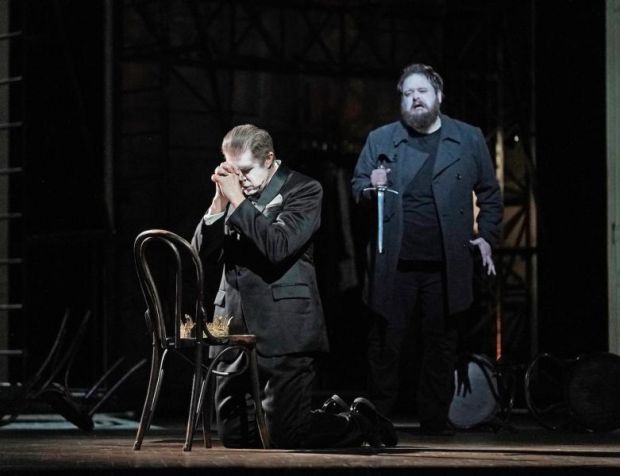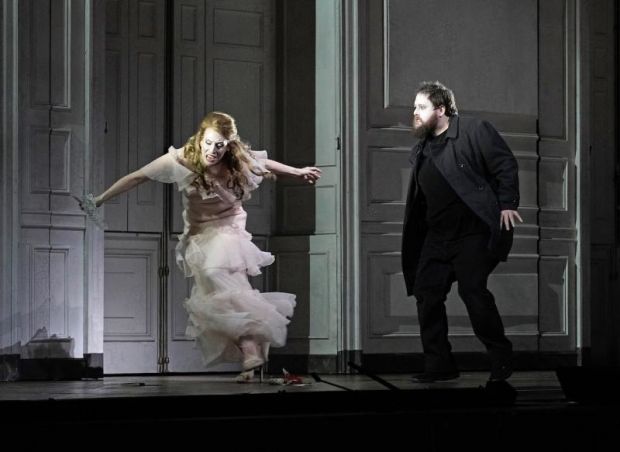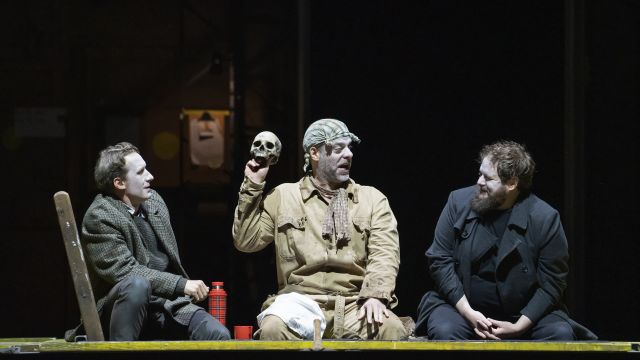Hamlet
Brett Dean and Matthew Jocelyn tread on dangerous ground when adapting Shakespeare’s iconic masterpiece Hamlet for the opera stage. It could be a raging success or a dismal failure. Fortunately, it is the former. This production, staged by the Metropolitan Opera, delves deep into the psyche of the Prince of Demark, revealing his darkest fears.
Dean and Jocelyn’s adaption is spot on. They have duplicated the running time of the play pruning dialogue and inserting music. It is interesting that “To be, or not to be”, arguably the most famous line of dialogue in theatre does not get its own full-fledged aria, it is more a muttered mantra to calm Hamlet’s mind.
The piece is brooding, moving, and riveting and features a small choir in the orchestra pit, and musicians in balcony boxes for fanfares. Unlike similar opera productions featuring singers that stand and deliver, this production invests the performers with a gutsy reality that invokes a guttural reaction from any audience.

Neil Armfield’s incredible production, which originated at Glyndebourne, but has been scaled up for the Met, is big in every way. The singers’ faces are caked in white, like Kabuki actors. Alice Babidge’s aristocratic costumes hover between the present day and the 1960s, and Ralph Myers’s set, lit by Jon Clark with glaring daylight and melancholy sunset, is an imposing ballroom that breaks apart and rotates to become a theatre’s backstage.
Conductor Nicholas Carter’s orchestra is tense and exciting reflecting the emotional turmoil onstage. While there is not much for the melodically inclined opera lover to grab onto, there is structural and dramatic use of recognizable figures that anchors the listener to the narrative.

For the uninitiated to the works of the Bard, the story involves the ghost of the King of Denmark who tells his son Hamlet to avenge his murder by killing the new king, Hamlet's uncle. Hamlet feigns madness, contemplates life and death, and seeks revenge. His uncle, fearing for his life, also devises plots to kill Hamlet.
Tenor Allan Clayton, making his debut at the Met as Hamlet, is dishevelled, dolorous and deeply troubled. Barely leaving the stage during the performance, he is covered in sweat by the end. Not only is his singing supple and beautifully unrestricted, but he also has an easy, natural physicality that is extremely rare among opera singers. Without losing the character’s desperation, Clayton makes Hamlet real.
Bass-baritone John Relyea excels in the triple role of The Ghost/First Player/Gravedigger, giving us unnerving eeriness combined with a sense of comedy.

Coloratura soprano Brenda Rae is especially moving in the early scenes, while her mad scene, in mud-soiled underwear, matted hair, and a man’s tailcoat, pounding on her chest, is eerie without overstatement. Moments later, she runs around the stage, while singing extreme and secure high notes, before jumping into Claudius’ arms. No mean feat.
Bass Rod Gilfry plays Claudius as illustrious and elegant; there is a coolness and aloofness to his portrayal, a veneer that is easily broken under stress, while mezzo-soprano Sarah Connolly as Gertrude gives her role true pathos without resorting to caricature. Connolly cries out in the opera’s final scene that she’s been poisoned with an assertiveness which contrasts strongly with her initial innocent portrayal.
Tenor William Burden as Polonius manages to play up the character’s more comic traits with tremendous vocal security.

The countertenor duo of Christopher Lowrey and Aryeh Nussbaum Cohen make the most of Rosencrantz and Guildenstern. They not only get some of the most enjoyable music but deliver it as delightfully toadyish characters. Their early duet is notable for how beautifully they blend their timbres together to both feel like one, but also emphasising their differences.
Tenor David Butt Philip’s Laertes is elegant and polite in his approach in earlier scenes but noticeably violent in the latter ones and baritone Jacques Imbrailo gives the role of Horatio heart and delivers the ending music beautifully.
The Metropolitan Opera chorus, while not having a lot to do, give us many memorable choral moments including a collection of groaning glissandos in the final swordfight-and-poisoning scene.

Hamlet is a long score, coming in at two hours and 45 minutes, and its pace conspicuously slows during a finale that unfolds to its inevitable conclusion. But with such a glorious confident vision as Dean and Jocelyn’s, who would want it to end any sooner?
Barry Hill
Subscribe to our E-Newsletter, buy our latest print edition or find a Performing Arts book at Book Nook.

